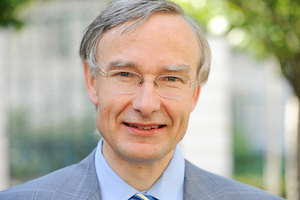Interview with Jean-Charles de Hemptinne, EleTher chair holder and researcher-lecturer at IFP School

IFP School has just created, with the support of the AFI (French Association for Industry Training), a new teaching and research chair entitled “Electrolyte Thermodynamics” (EleTher).
Launched for a period of three years, it is led by Jean-Charles de Hemptinne, researcher-lecturer at IFP School, who tells us more.
1. Why has this new chair been created?
This chair focuses on the application of thermodynamic tools to improve the efficiency of recycling processes. Its purpose is to develop and promote research on the thermodynamics of the aqueous phase containing different products. The aqueous phase can itself be a waste product that needs to be treated before being recycled or be the solvent used in a product (typically a metal) conversion process. Water is an extremely complex product that hides a number of behaviors that current science is unable to explain! In a mixture with acids, bases and organic solvents, existing industrial models struggle to describe the properties necessary to develop the processes we want to model.
Re-using products makes it possible to reduce both pressure on natural resources and waste-related pollution. It is a rapidly-evolving sector, driven to develop innovative approaches to improve its efficiency and, consequently, its environmental impact. In creating this new chair, we are adapting our training programs with the aim of anticipating the growing need for expertise in the field of recycling and reinforcing our positioning when it comes to environmental issues.
This chair also fits squarely with the research I am already conducting at IFP Energies nouvelles within the context of the EleTher Joint Industry Project, launched in 2019 and currently involving seven industrial partners.
2. What are the chair’s research priorities?
Research will focus on four priority areas:
- the setting up of innovative experimental measurements to access complementary microscopic and macroscopic data;
- the understanding of interactions between species in a solution containing electrolytes;
- the development of modeling tools (equations of state) that can be used in process simulators;
- the evaluation of the sensitivity of simulator results compared to the data employed.
3. Has the research already begun?
Yes, for the Elether JIP, a first PhD thesis, entitled “Analysis of electrolyte solvation within the primitive equation of state framework”, was launched in 2019 relating to the study of an equation of state based on thermostatistical concepts, making it possible to correctly predict high ionic species concentrations or high temperatures.
We are going to launch a second thesis at the end of the year to extend the subject to solvents containing organic species.
4. What is the latest news concerning the chair?
On 19 May, with the support of the EleTher Joint Industry Project, the European Symposium on Applied Thermodynamics organized a webinar focusing on scientific progress in the field of electrolyte thermodynamics.
I used the webinar as an opportunity to present the principal results of the Joint Industry Project and announced our intention to launch another such project in January 2022. The results can be summarized in two main points. The first concerns data analysis. It turns out that even with simple systems, unexplored operating conditions remain (for some salts, data are only available for 25°C, whereas processes often work at high temperatures). The second point concerns model calibration: models often contain numerous parameters that need to be adjusted on the basis of experimental data. A good practices guide is available to address industry’s concerns about the quality of these models.
Interview conducted by Meyling Siu